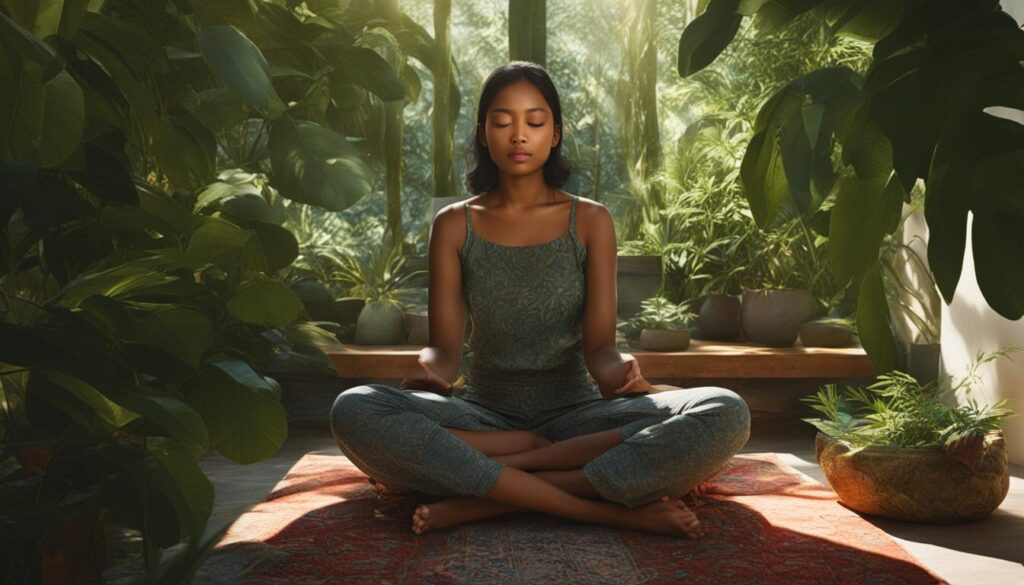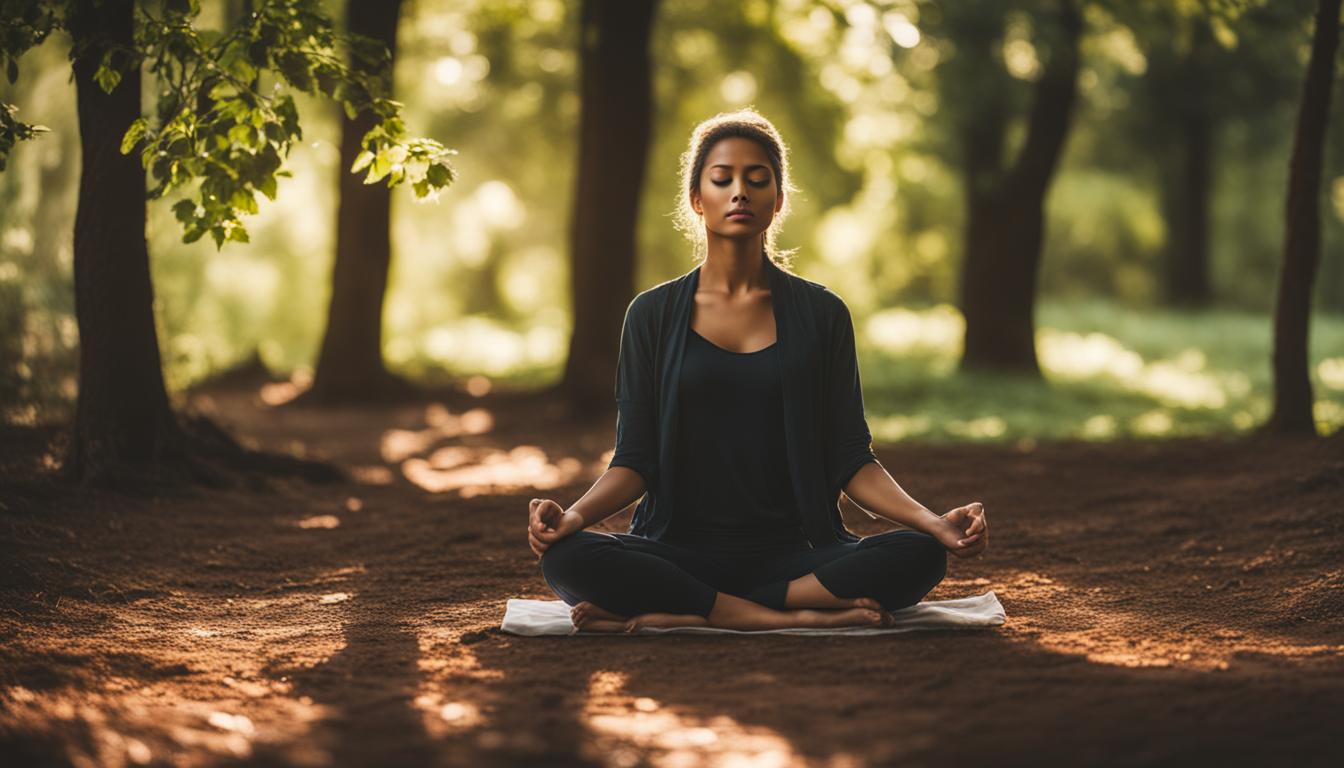In our fast-paced world, it’s easy to get caught up in the chaos and lose touch with the present moment. That’s where the power of meditation and mindfulness comes in. By incorporating these practices into your daily life, you can learn to live in the here and now, finding peace and fulfillment in the present.
Mindfulness is the practice of being fully engaged in the present moment without judgment. It allows you to cultivate awareness and acceptance of your thoughts, emotions, and sensations. Meditation, on the other hand, is a technique used to cultivate mindfulness. Through techniques like focusing on the breath or observing thoughts, meditation helps quiet the mind and deepen your connection with the present moment.
The power of mindfulness and meditation is undeniable. Research has shown that these practices can reduce stress and anxiety, improve self-awareness and focus, boost creativity, and strengthen our overall mental health and well-being. By mastering the art of living in the present, you can experience a greater sense of peace, contentment, and fulfillment in your life.
Key Takeaways:
- Mindfulness and meditation help you live in the present moment without judgment.
- These practices reduce stress, anxiety, and enhance mental well-being.
- By mastering mindfulness and meditation, you can experience a deeper sense of peace and fulfillment.
- Research has shown that mindfulness and meditation improve focus, creativity, and self-awareness.
- Incorporating mindfulness and meditation into your daily life can bring about profound transformations.
Understanding Mindfulness and Meditation: How They Work Together
Mindfulness and meditation are two closely intertwined practices that work synergistically to cultivate a deeper sense of awareness and presence in our lives. While they share similarities, it is important to understand the unique qualities and functions of each.
Mindfulness is the practice of fully engaging in the present moment without judgment. It is about being aware of our thoughts, feelings, bodily sensations, and the environment around us. Mindfulness invites us to observe our experiences without getting caught up in them, allowing us to cultivate a sense of clarity and non-reactivity.
Meditation, on the other hand, is a specific technique used to cultivate mindfulness. It involves intentionally focusing our attention and quieting the mind. Through regular meditation practice, we develop the ability to detach from our thoughts and emotions, creating space for a deeper level of self-awareness and insight.
By combining mindfulness and meditation, we can experience profound transformations in our lives. The practice of mindfulness lays the foundation for meditation, as it helps us develop the necessary skills of attention and non-judgment. Meditation, in turn, deepens our mindfulness practice by providing a dedicated space to cultivate present-moment awareness.
The Benefits of Mindfulness and Meditation
The benefits of mindfulness and meditation are numerous and far-reaching. They have been scientifically proven to reduce stress and anxiety, enhance self-awareness, improve focus and attention, boost creativity, and promote overall mental health and well-being.
Mindfulness and meditation can help us break free from the constant distractions of our modern lives and fully engage with the present moment. They provide us with a toolkit for managing our thoughts and emotions, allowing us to respond to situations with greater clarity and equanimity.
Additionally, the practice of mindfulness and meditation has been linked to physical health benefits, such as improved immune system function. By incorporating these practices into our daily lives, we can cultivate a deeper connection with ourselves and the world around us, leading to a more fulfilling and peaceful existence.
| Mindfulness | Meditation |
|---|---|
| Focus on the present moment | Technique to cultivate mindfulness |
| Non-judgmental awareness | Quiets the mind |
| Enhances self-awareness | Fosters self-discovery |
| Reduces stress and anxiety | Improves mental well-being |
Summarizing, mindfulness and meditation are complementary practices that work hand in hand to enhance our physical, mental, and emotional well-being. By understanding their unique qualities and incorporating them into our daily lives, we can experience a deeper sense of presence and inner peace.
The Transformative Benefits of Mindfulness and Meditation
Scientific research has revealed numerous benefits of mindfulness and meditation. By incorporating these practices into your daily life, you can experience profound transformations in your mental health and overall well-being.
Mindfulness and Mental Health
Mindfulness has been proven to reduce stress, anxiety, and depression. By practicing mindfulness, you can cultivate a sense of calm and relaxation, allowing you to better manage and overcome daily challenges. Studies have shown that mindfulness-based interventions can be effective in reducing symptoms of depression and anxiety disorders, improving overall mental health.
Meditation for Stress Reduction
Meditation is a powerful tool for stress reduction. By taking the time to sit quietly and focus your attention, you can calm your mind and promote relaxation. Regular meditation practice has been shown to decrease the production of stress hormones, lower blood pressure, and improve heart rate variability. These physiological changes contribute to a reduced stress response and an increased ability to cope with life’s inevitable challenges.
Benefits of Mindfulness and Meditation
| Benefit | Explanation |
|---|---|
| Improved Focus and Attention | Mindfulness and meditation can enhance your ability to stay focused on the present moment, leading to increased concentration and productivity. |
| Increased Emotional Resilience | Regular mindfulness and meditation practice can help you develop emotional resilience, enabling you to bounce back from setbacks and manage difficult emotions. |
| Boosted Creativity | Mindfulness and meditation have been linked to increased creative thinking and problem-solving abilities, as they allow for a greater flow of ideas and insights. |
| Strengthened Immune System | Research suggests that mindfulness and meditation can have a positive impact on immune function, potentially reducing the risk of illness and enhancing overall well-being. |
Incorporating mindfulness and meditation into your daily routine can lead to a greater sense of well-being, improved mental health, and a more balanced and fulfilling life. Start by dedicating a few minutes each day to these practices, gradually increasing the duration as you become more comfortable. With consistency and patience, you can experience the transformative benefits of mindfulness and meditation.

Cultivating Mindfulness and Meditation: Practical Tips for Daily Practice
Cultivating mindfulness and meditation in your daily life can have transformative effects on your well-being and overall happiness. Incorporating these practices into your routine doesn’t have to be complicated or time-consuming. By following a few simple tips, you can develop a sustainable mindfulness and meditation practice that fits seamlessly into your daily life.
Creating a Sacred Space for Practice
Designating a specific area in your home as a sacred space for mindfulness and meditation can help create a sense of focus and intention. Find a quiet corner or a cozy spot where you feel calm and at peace. Decorate it with items that inspire tranquility, such as candles, plants, or symbols that hold personal meaning for you. Having a dedicated space will make it easier to establish a consistent practice.
Starting Small and Gradually Increasing Time
When starting your mindfulness and meditation journey, it’s important not to overwhelm yourself with long sessions right away. Begin by setting aside just a few minutes each day for practice. As you become more comfortable, gradually increase the duration of your sessions. Consistency is key, so aim for daily practice even if it’s just for a few minutes.
Incorporating Mindfulness into Daily Activities
Mindfulness is not limited to formal meditation sessions. You can cultivate mindfulness throughout your entire day by bringing present-moment awareness to your daily activities. Whether it’s brushing your teeth, walking, or eating, fully engage your senses and focus on the task at hand. This practice can help you stay grounded and connected to the present moment.
Using Reminders and Mindful Triggers
Incorporating reminders into your daily life can be a helpful way to maintain mindfulness and meditation practice. Set alarms or calendar notifications to prompt you to pause and take a few mindful breaths throughout the day. You can also create mindful triggers, such as placing sticky notes with affirmations or quotes in visible locations around your home or workspace.
Remember, cultivating mindfulness and meditation is a personal journey, and there is no right or wrong way to practice. Find what works best for you, be patient with yourself, and embrace the process. With consistent effort and dedication, you can integrate mindfulness and meditation into your daily life and experience the many benefits they offer.


Conclusion: Embracing Mindfulness and Meditation for a Fulfilling Life
Mindfulness and meditation are not just fleeting trends but powerful tools for enhancing your well-being and finding inner peace in today’s fast-paced world. By embracing these practices, you can experience a deeper sense of connection, contentment, and fulfillment.
Mindfulness is about being fully present in the moment, without judgment. It allows you to appreciate the beauty and richness of each experience, leading to a greater sense of well-being. Meditation, on the other hand, is a technique that helps cultivate mindfulness by quieting the mind and enhancing your ability to focus. Through meditation, you can find a calm and clarity that carries over into all aspects of your life.
Embracing mindfulness and meditation can have profound effects on your well-being. They can reduce stress and anxiety, improve your self-awareness and emotional resilience, boost your creativity, and even strengthen your immune system. By incorporating these practices into your daily life, you can cultivate a greater sense of balance, purpose, and tranquility.
Remember, embracing mindfulness and meditation is an ongoing journey. It takes dedication and consistency to experience the transformative benefits they offer. So start small, make them a part of your daily routine, and watch as your well-being and inner peace flourish.
FAQ
What is mindfulness?
Mindfulness is the practice of focusing on the present moment without judgment.
What is meditation?
Meditation is a technique used to cultivate mindfulness.
What are the benefits of mindfulness and meditation?
Mindfulness and meditation can reduce stress and anxiety, improve self-awareness and focus, boost creativity, and strengthen overall mental health and well-being.
How do mindfulness and meditation work together?
Mindfulness and meditation are closely related practices that work together to cultivate a deeper sense of awareness and presence. Mindfulness is about being fully engaged in the present moment without judgment, while meditation is a technique used to cultivate mindfulness.
How can mindfulness and meditation improve mental health?
Research has shown that mindfulness and meditation can reduce stress, anxiety, and depression, enhance self-awareness, improve focus and attention, increase emotional resilience, and even strengthen the immune system.
How can I incorporate mindfulness and meditation into my daily life?
Start by focusing on your breath and fully engaging with your activities. Dedicate a specific time each day for mindful meditation, find a quiet spot, and focus on your breath. Cultivating an attitude of gratitude is also essential. Start small and gradually increase the time dedicated to mindfulness and meditation. Using reminders and incorporating mindfulness into daily routines can also help make these practices a part of your daily life.
Are mindfulness and meditation lifelong practices?
Yes, mindfulness and meditation are lifelong practices. With dedication and consistency, these practices can bring about profound transformations in our lives.
How can mindfulness and meditation lead to a more fulfilling life?
By focusing on the present moment and embracing the practices of mindfulness and meditation, we can experience enhanced well-being, inner peace, and a deeper connection with ourselves and the world around us.
Source Links
- https://medium.com/@amarifaepowell/mastering-the-art-of-mindfulness-and-meditation-a-pathway-to-enhanced-well-being-660b7dbe855c
- https://medium.com/@kinzaexplores/the-art-of-mindfulness-embracing-the-present-moment-for-a-fulfilling-life-ca5938288b4
- https://www.goodreads.com/book/show/29779239-the-art-of-living




